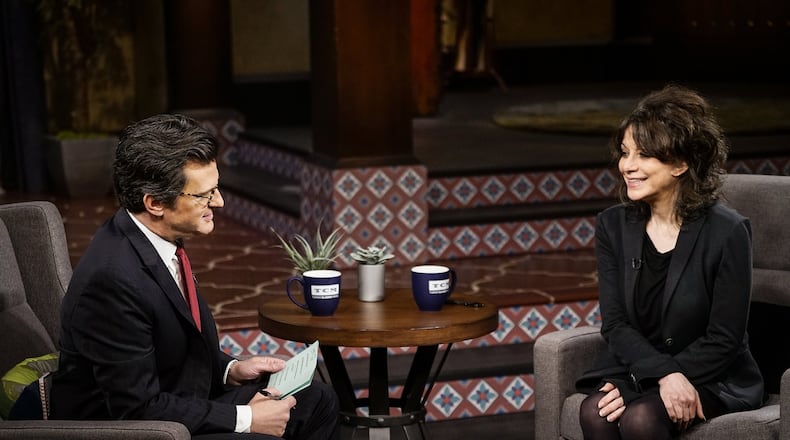On an average day down at the studios of Turner Classic Movies, the conversation ranges far and wide, from Raquel Welch's fur bikini in "One Million Years B.C." to Federico Fellini's loopy hymn to movie-making in "8 1/2."
Amy Heckerling, director of "Fast Times at Ridgemont High" and the frothy "Clueless" and a member of Hollywood's small club of very successful female directors, is chatting with host Ben Mankiewicz about Fellini, a director whose surreal work is a long way from Heckerling's sly take on the SoCal high school zeitgeist.
But, says Heckerling, they have more in common than it seems. (Heckerling, a pale, dark-haired native of the Bronx, looking Goth in a black-on-black minidress, is a guest programmer for an evening of TCM movies, to be broadcast Monday, Dec. 19.)
"I think it's the most brilliant film ever made about creativity," Heckerling says of the 1963 Fellini film. "He touches on every aspect of it, your upbringing, your parents, your religion, the people you have the hots for. There's the inner child who wants to play and there's the critic. And you have to balance them, too, or you'll either never make anything, or you'll make a (expletive) load of crap. Can I say that on television?"
Yes, in fact, you can, Mankiewicz reassures her.
These freewheeling conversations, and the uncut, uninterrupted movies that go with them, are the elements that make Atlanta-based TCM a fond cable-channel destination for a devoted audience.
Turner Classic Movies launched in 1994, showing movies from the vast library of MGM films acquired by TBS founder Ted Turner. Later the cable channel began licensing movies from a variety of studios. It shows classic films without commercial interruption, and the hosts bring on moviemakers, actors and others for conversations about film.
Founding host Robert Osborne has recently been absent from the show due to medical reasons. Mankiewicz, who joined TCM in 2003, has shared hosting duties with Tiffany Vazquez and actor Alec Baldwin, who’s showing up on “Saturday Night Live” regularly these days with his Donald Trump impersonation.
The studios are in a subterranean keep, insulated from the roaring, banging and grinding sounds that accompany extensive renovations at Turner’s Techwood campus. It’s a sprawling complex, wedged between Georgia Tech and the Downtown Connector.
Down beneath the Georgia soil, Mankiewicz sits in an easy chair on a tile floor with Palladian arches behind him. “This looks like something out of California,” says Heckerling. “That’s the idea,” says Mankiewicz.
Mankiewicz seems genetically engineered to love cinema. His grandfather was Herman Mankiewicz, co-writer of "Citizen Kane" and "The Wizard of Oz" among others, and the grandson takes his role as a curator and promoter of America's classic film patrimony very seriously.
“Our fans, they feel connected to Robert, to Tiffany, to me,” said Mankiewicz, who changes suits in between tapings with Heckerling and with another guest programmer, animator Travis Knight.
The TCM fans tell him, “You are the people who are the guardians of this legacy,” Mankiewicz said. “You’re doing a good job, but don’t (screw) it up.” He sums up his role: “We’re a vessel for all that classic movie love.”
Travis Knight is the son of Nike billionaire Phil Knight, and the CEO of Laika studios, named after the first dog in space. His first feature, 2009's lovely and creepy "Coraline," won animation awards and an Oscar nomination.
He’s visiting the TCM studios to discuss those scary dinosaurs in “One Million Years B.C.,” the creation of brilliant animator Ray Harryhausen. “We’re talking about stop-motion animation,” says Knight, “but I think (Raquel Welch) is the reason people see the movie.”
The laborious process of incrementally moving and posing doll-sized figures has come into its own with Tim Burton's "Nightmare Before Christmas," and Knight extended the genre even further in this year's "Kubo and the Two Strings,"which he describes as a David Lean-style epic — albeit made with tabletop creatures.
Knight tells Mankiewicz that his father, Phil Knight, with a degree from Stanford, disappointed his own parents by deciding to sell shoes out of his trunk. The younger Knight apparently got the same reaction when he told his (by-then-wealthy) father that he wanted to make films by moving dolls around. “The Knight boys have a long history of disappointing their fathers.”
As a guest programmer, Knight picks two other classics of stop-motion art: the original "King Kong" (from 1933) and "Clash of the Titans" (1981).
Heckerling's choices as a guest host range from the unpredictable (the 1920 German expressionist nightmare, "The Cabinet of Dr. Caligari") to the joyful (James Cagney's 1933 escapist musical "Footlight Parade," with dance numbers choreographed by Busby Berkeley.)
It turns out that Cagney made a big impression on a youthful Heckerling. In the 1960s, she and her father watched Cagney movies together at their apartment in the Bronx, and if her siblings were watching “Bonanza” on television, she’d go to her grandparents’ apartment upstairs and see what was on “Million Dollar Movie.”
“He appealed to me way before kindergarten,” she tells Mankiewicz. “Other kids liked Bugs Bunny. I liked James Cagney.”
AMY HECKERLING’S PICKS FOR TCM
Amy Heckerling, director of “Fast Times at Ridgemont High” and “Clueless,” serves as a guest programmer on Turner Classic Movies for the evening of Monday, Dec. 19. Her choices and their airtimes:
8 p.m.: “The Roaring Twenties” (1939)
10 p.m.: “Footlight Parade” (1933)
Midnight: “8 1/2” (1963)
2:30 a.m.: “The Cabinet of Dr. Caligari” (1920)









